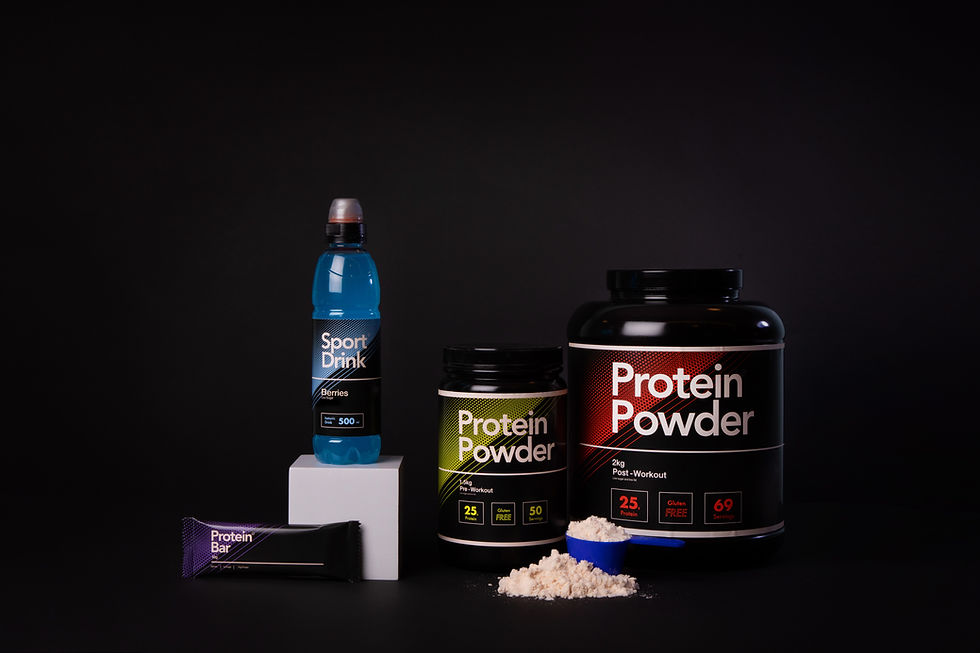SUPPLEMENTS - THE GOOD, THE BAD, THE UNPROVEN
- Kennet Bath

- 3 days ago
- 3 min read

The supplement industry is a multi-billion-dollar market filled with both beneficial products and misleading claims. Navigating this landscape can be challenging. Here's an inside look at which supplements are supported by research, which are overhyped, and how to choose products you can trust.
The Reliable Performer - Protein Supplements
Protein is essential for muscle gain, fat loss, and overall health. Protein shakes, whether from whey or plant sources, are convenient ways to meet your daily protein needs. Studies show that replacing one meal with a protein shake can aid in weight loss by controlling hunger and reducing calorie intake.
Whey vs. Plant Protein: Both can be effective. Whey protein isolate is high-quality and easily absorbed. For plant proteins, look for blends (like pea and rice) that provide a complete amino acid profile.
Tip: Choose products with at least 20 grams of protein per serving and be mindful of added ingredients that increase calorie content.
Quality Matters - Third-Party Certification
Not all supplements are created equal. Some products have inaccurate labels, contain banned substances, or don't provide the ingredients they claim.
Action Step: Opt for supplements that have third-party certifications like NSF Certified for Sport or Informed Sport. This ensures the product has been tested for quality, purity, and safety.
Fish Oil - Beneficial When Needed
Fish oil supplements can support heart and brain health, especially for those who don't consume enough fatty fish.
Key Benefits
- Heart Health: Omega-3 fatty acids support cardiovascular function.
- Brain Health: May enhance cognitive function and reduce inflammation.
- Sleep Improvement: Linked to better sleep quality and duration.
- Guideline: If you eat less than two servings of fatty fish per week, a supplement providing around 840 mg of EPA/DHA may be beneficial.
Vitamin D - Assess Before You Supplement
While vitamin D is important, most people get enough from sunlight and fortified foods.
Cognitive Health: Some studies suggest vitamin D supplementation may reduce the risk of dementia.
Recommendation: Get your vitamin D levels tested before supplementing.
Multivitamins - Potential Cognitive Benefits for Older Adults
For individuals over 60, a daily multivitamin may improve memory and cognitive function.
Note: Multivitamins are not a substitute for a balanced diet but can complement nutritional intake.
Collagen - Skin Health Support
Collagen supplements may improve skin elasticity, hydration, and reduce wrinkles over time.
Usage: Benefits are typically observed after 12 to 24 weeks of consistent use.
Limitations: Collagen is not a complete protein and doesn't support muscle building like other protein supplements.
Supplements to Approach with Caution
BCAAS: Often overrated, as complete protein sources provide all necessary amino acids more effectively.
Fat Burners: Generally ineffective for weight loss; focus on diet and exercise instead.
Glutamine: Not effective for muscle growth but may support gut health.
Echinacea and Ginkgo Biloba: Research does not support their effectiveness for improving exercise performance or cognitive function.
Creatine - A Multifaceted Supplement
Creatine is one of the most researched and effective supplements for muscle strength and cognitive function.
Benefits
Muscle Gain: Enhances strength and exercise performance.
Brain Health: May improve memory, focus, and protect against neurological diseases.
Safe for Most People: Studies show no adverse effects on kidney health in healthy individuals.
Dosage: Typically, 3 to 5 grams per day for muscle benefits; up to 10 grams may be used for cognitive effects.
Other Noteworthy Supplements
Probiotics: May improve gut health, cognitive function, mood, and sleep in older adults.
Turmeric (Curcumin): Has anti-inflammatory properties that may reduce pain and improve recovery. Requires consistent use over time.
Ashwagandha: Some evidence suggests it may reduce stress, improve sleep, and enhance workout performance.
Beta-Alanine: May improve high-intensity exercise performance when taken in appropriate doses.
Supplements with Limited Evidence
Zinc: May reduce the duration of a cold but won't prevent one.
CBD: Current research does not support its effectiveness for improving insomnia.
Adaptogens: Many lack sufficient human studies to confirm their purported benefits.
Focus on Foundational Health Habits
Before turning to supplements, prioritize these five pillars of health
1. Sleep: Aim for 7–9 hours per night.
2. Exercise: Engage in regular physical activity.
3. Nutrition: Eat a balanced diet rich in whole foods.
4. Stress Management: Practice relaxation techniques and maintain a positive mindset.
5. Social Connection: Foster relationships and engage with your community.
Conclusion
Supplements can play a supportive role in your health journey, but they are not magic solutions. Focus on proven products, verify the quality through third-party certifications, and remember that a foundation of healthy habits is essential for any supplement to be truly effective.






